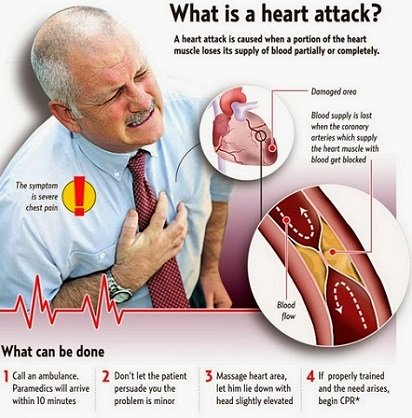
Heart attack first aid
A heart attack is a medical emergency. Call your local emergency number if you think you or someone else is having a heart attack.
The average person waits 3 hours before seeking help for symptoms of a heart attack. Many heart attack patients die before they reach a hospital. The sooner the person gets to the emergency room, the better the chance of survival. Prompt medical treatment reduces the amount of heart damage.
This article discusses what to do if you think someone may be having a heart attack.
Causes
A heart attack occurs when the blood flow that carries oxygen to the heart is blocked. The heart muscle becomes starved for oxygen and begins to die.
Symptoms
Symptoms of a heart attack can vary from person to person. They may be mild or severe. Women, older adults, and people with diabetes are more likely to have subtle or unusual symptoms.
Symptoms in adults may include:
Changes in mental status, especially in older adults.
Chest pain that feels like pressure, squeezing, or fullness. The pain is most often in the center of the chest. It may also be felt in the jaw, shoulder, arms, back, and stomach. It can last for more than a few minutes, or come and go.
Cold sweat.
Lightheadedness.
Nausea (more common in women).
Numbness, aching, or tingling in the arm (usually the left arm, but the right arm may be affected alone, or along with the left).
Shortness of breath.
Weakness or fatigue, especially in older adults and in women.
First Aid
If you think someone is having a heart attack:
Have the person sit down, rest, and try to keep calm.
Loosen any tight clothing.
Ask if the person takes any chest pain medicine, such as nitroglycerin, for a known heart condition, and help them take it.
If the pain does not go away promptly with rest or within 3 minutes of taking nitroglycerin, call for emergency medical help.
If the person is unconscious and unresponsive, call 911 (or your local emergency number), then begin CPR.
If an infant or child is unconscious and unresponsive, perform 1 minute of CPR, then call 911.
DO NOT
Do NOT leave the person alone except to call for help, if necessary.
Do NOT allow the person to deny the symptoms and convince you not to call for emergency help.
Do NOT wait to see if the symptoms go away.
Do NOT give the person anything by mouth unless a heart medicine (such as nitroglycerin) has been prescribed.
When to Contact a Medical Professional
Call your local emergency number immediately if the person:
Does not respond to you
Is not breathing
Has sudden chest pain or other symptoms of a heart attack
Prevention
Adults should take steps to control heart disease risk factors whenever possible.
If you smoke, quit. Smoking more than doubles the chance of developing heart disease.
Keep blood pressure, cholesterol, and diabetes in good control and follow your health care provider's orders.
Lose weight if obese or overweight.
Get regular exercise to improve heart health. (Talk to your provider before starting any new fitness program.)
Eat a heart-healthy diet. Limit saturated fats, red meat, and sugars. Increase your intake of chicken, fish, fresh fruits and vegetables, and whole grains. Your provider can help you tailor a diet specific to your needs.
Limit the amount of alcohol you drink. One drink a day is associated with reducing the rate of heart attacks, but two or more drinks a day can damage the heart and cause other medical problems.
Ela